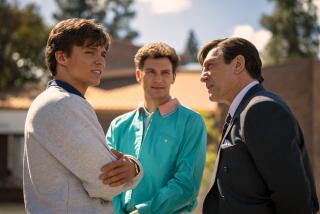Weather Lifts, So Does the Music at Ojai Festival
The June music festival in Ojai is world-famous for its lively programming and lovely setting. But for the typical Southern Californian who lives so much in sun and haze, it can also be a lecture on the weather.
The 51st Ojai Festival, under the artistic direction of pianist Emanuel Ax this year, had begun magnificently Friday night, with chamber music enlivened by the all the natural peculiarities of the outdoor Libbey Bowl. But as the weather darkened Saturday, so had some of the music making.
But after a night of rain, a rosy fog hugged the mountains Sunday morning and clarinetist Richard Stoltzman responded to it with a roseate performance of Schubert’s “Arpeggione” Sonata. Celebrating Schubert’s 200th birthday was one of Ax’s intentions in programming the festival. Another, though unstated, seemed to be watching what happens to classical period music when viewed in a distorting mirror.
Stoltzman’s “Arpeggione” was a distortion in that it is a quirky clarinet transcription of a work usually performed on the cello. And there is further distortion in his attempt to be a classical music hipster, shifting tone color from note to note as dramatically as the shifting light of Ojai and phrasing with self-congratulating flourishes.
But here it worked, producing fluid, clear, warm, lyric Schubert, attentively accompanied by Ax, and full of fun. And Stoltzman inserted a remarkable surprise Schubertian cadenza of “Happy Birthday” (Sunday was Ax’s 48th birthday) as transition from heavenly slow movement to lilting Finale. Sunday mornings are for just this sort of thing, as they are for the brunch-style jazz Stoltzman offered with his pianist son, Peter, after intermission. There was, as well, the java jolt of Steve Reich’s 11-clarinet “Vermont Counterpoint” Stoltzman plays with 10 clones of himself on tape.
*
Next up for redemption was Daniel Harding, who led the late afternoon final concert. This was not an easy festival for the 21-year-old British conductor making his American debut. He came here with much unusual music to learn and little time to rehearse it. And he faced grumpy Los Angeles Philharmonic players ready for vacation.
Still, this is a conductor of tremendous promise and verve, and his collaboration with Ax in Mozart’s early piano concerto known as the “Jeunehomme” was a delight. I don’t know who chose the tempos in the Mozart--so slow in the slow movement, so fast in the last movement, so mercurial in the first movement--but they ideally captured the youthful spirit of what is often considered Mozart’s first masterpiece. The sun, as if in response to the sheer luster of Ax’s playing, began to peek through the clouds for the first time all day.
The weather, however, hurt Alfred Schnittke’s “Moz-Art a la Haydn,” which opened the program. A theater piece meant to begin and end in complete darkness, it is a trope on history symbolic of Soviet musical life. Ojai was too pretty; Harding too forthright.
Also forthright and forgettable were minor small Schubert pieces for violin and orchestra--Polonaise in B-flat and Konzertstuck in D--dutifully played by Cho-Liang Lin. But then the weather asserted itself once more at the end, in a rare outing for the suite from Rameau’s last opera, “Les Boreades.”
This is opera about weather, where ill-tempered gods unnerve mankind with storms and earthquakes. Horns howl; strings follow the mad dance of blowing leaves; percussion roars. It is wonderful music, all ornament and effect suited for flexible Baroque period instruments and a real challenge for a modern orchestra. The Philharmonic players sounded game if also hanging on for dear life.
Harding drove them with endearing enthusiasm, and with the flurry of the final contradance all the clouds had finally been blown from the early evening sky. Rameau was a radical colorist, and now Ojai had readied itself for one of its famed “pink moments” at sunset.
Next year, Ernest Fleischmann succeeds outgoing artistic director Ara Guzelimian, and the music director of the 52nd Ojai festival, May 29-31, will be the great pianist Mitsuko Uchida.
More to Read
The biggest entertainment stories
Get our big stories about Hollywood, film, television, music, arts, culture and more right in your inbox as soon as they publish.
You may occasionally receive promotional content from the Los Angeles Times.











